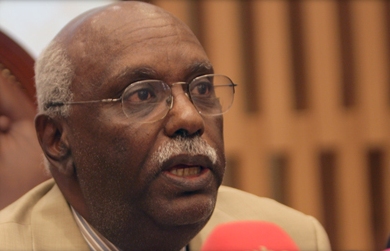Sudan resumes strengthening bilateral ties with South Sudan ahead of talks
August 31, 2012 (JUBA/KHARTOUM) – The Sudanese government is resuming strengthening and restoring bilateral relations with its former region South Sudan, with whom it is in engaged in a number of post secession disputes, days before talks between the two states are due to begin in Ethiopia.

It was the first official visit between the two countries since they engaged in a brief border war in April over the disputed oil region of Heglig/Panthou.
Despite having six years of a peace deal to resolve numerous issues including demarcating the new international border, oil, security, and the disputed region of Abyei, South Sudan seceded in July last year with all these thorny issues unresolved.
The two countries reached earlier this August an agreement over oil transportation fees, talks on other outstanding issues are due to resume in Ethiopia after the funeral of former Prime Minister, Meles Zenawi.
Rahamat-Allah’s visit was brought about by an invitation by South Sudan Ministry of Foreign Affairs and International Cooperation to their counterparts in Khartoum and is considered a step towards boosting efforts to resolving conflicts between the two sides.
In a statement broadcast by South Sudan Television on Thursday, Osman said diplomats and politicians were “different groups” and do not share the same views.
“Diplomats advocate for dialogue and peaceful settlement while politicians have different approaches”, said Rahamat-Allah at Juba International Airport in a statement broadcast live on state television on Thursday evening.
The Sudanese diplomat explained that his country has entrusted the Ministry of Foreign Affairs with the role of creating peaceful relations with other countries. Sudan needs to treat South Sudan in a special way because the new country has more added value than other neighbours, he said, adding that his country had committed itself to promoting peaceful cooperation with South Sudan.
“Our relations could reinforce the ongoing negotiations process to reach a good result between the two countries for the interest of the citizens in both the north and South,” he said.
Few official statements have been made about what was discussed in the meeting, which was held behind closed doors. But sources within South Sudan’s Ministry of Foreign Affairs claimed the visit was a step towards boosting bilateral ties between the two nations.
“I was not in the meeting but I am told by my colleagues that number of issues aiming at promoting bilateral ties were raised and discussed. Issues relating to regular interaction between diplomats at both embassies to raise and discuss issues of concerns were brought up and the two sides have agreed to set up committees to look into them”, an official with the South Sudan Ministry of Foreign Affairs and International Cooperation told Sudan Tribune on Friday.
The official further added that the meeting had discussed making use of expertise in fighting poverty; improving living conditions in identified areas; establishing small and medium-size enterprises and industrial clusters; and making use of traditional and ancestral contacts to reactivate and promote peaceful coexistence between the two states. Other issues raised at the meeting included intensifying diplomatic efforts to resume trade exchange at the border states.
South Sudan Undersecretary at the Ministry of Foreign Affairs and International Cooperation Charles Manyang Wol said the two ministries would exchange constant visits in order to revive and strengthen bilateral relations. He declined to offer comment on the agenda of the discussions.
The official, however, said the future stability of the economies of the two countries depend entirely on their relationship. Before relations soured and Sudan closed the border Sudan was South Sudan’s biggest trading partner and was the new nation’s only route export its oil.
“South and North share a lot in common. The future of our economies entirely depend our relations. This future is in our hands. It is waiting for us. Our generation and the next generation deserve [a] strong foundation. Relations between our citizens rely on political relations between the two states. They need peace and free movement required by the international relations,” he explained.
“Let us begin that future together,” he added.
In Khartoum, it was reported that Rahamat-Allah signed an agreement on the resumption of direct flights between the two countries as it was stopped four months ago.
The Sudanese official also said Khartoum and Juba are discussing ways to resume fluvial trips and to open land roads.
The two countries agreed in September 2011 to open crossing points and to organise border trade between the two sides. In November 2011 also the two neighbours inked security arrangements on the common border.
But the relations between the two sides deteriorated following the increase of attacks in South Kordofan by the Sudanese rebels that Khartoum says are backed by Juba and in January South Sudan stopped pumping oil through Sudan depriving both countries of much needed income in hard currency.
(ST)
